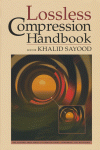

Most ebook files are in PDF format, so you can easily read them using various software such as Foxit Reader or directly on the Google Chrome browser.
Some ebook files are released by publishers in other formats such as .awz, .mobi, .epub, .fb2, etc. You may need to install specific software to read these formats on mobile/PC, such as Calibre.
Please read the tutorial at this link: https://ebookbell.com/faq
We offer FREE conversion to the popular formats you request; however, this may take some time. Therefore, right after payment, please email us, and we will try to provide the service as quickly as possible.
For some exceptional file formats or broken links (if any), please refrain from opening any disputes. Instead, email us first, and we will try to assist within a maximum of 6 hours.
EbookBell Team

4.3
8 reviewsNever before has the topic of lossless compression been so topical. That's why the recent publication of Lossless Compression Handbook, is so timely. It explains the process of compression and transmission of multimedia signals (images, text, audio and data) so that the decompressed or reconstructed data exactly match the original. Who is this book for? Engineers, scientists and other professionals who deal with image processing, signal processing, multimedia systems and wireless technology. It's for anyone who has a problem that requires compression. - EMedia, The Digital Studio Magazine, May 2003 This book will be of interest to every engineer or researcher who is working with coded data such as compressed images, text, or compressed data...Lossless Compression Handbook is a must read for all professionals who are working in the field of image coding such as JPEG 2000. Each chapter has numerous references that help the reader to explore more about topics of interest. Another interesting feature is that authors of individual chapters provide a note on how to go further on a particular topic at the end of the chapter. Pseudocode listing in most of the chapters enables quicker understanding and implements various algorithms discussed. Overall, this book is a wonderful introduction and a handy reference to the topic of lossless compression. I recommend this book in the library of every working individual who is working in this area of lossless compression. - IEEE Circuits & Devices Magazine, Sept./Oct. 2004